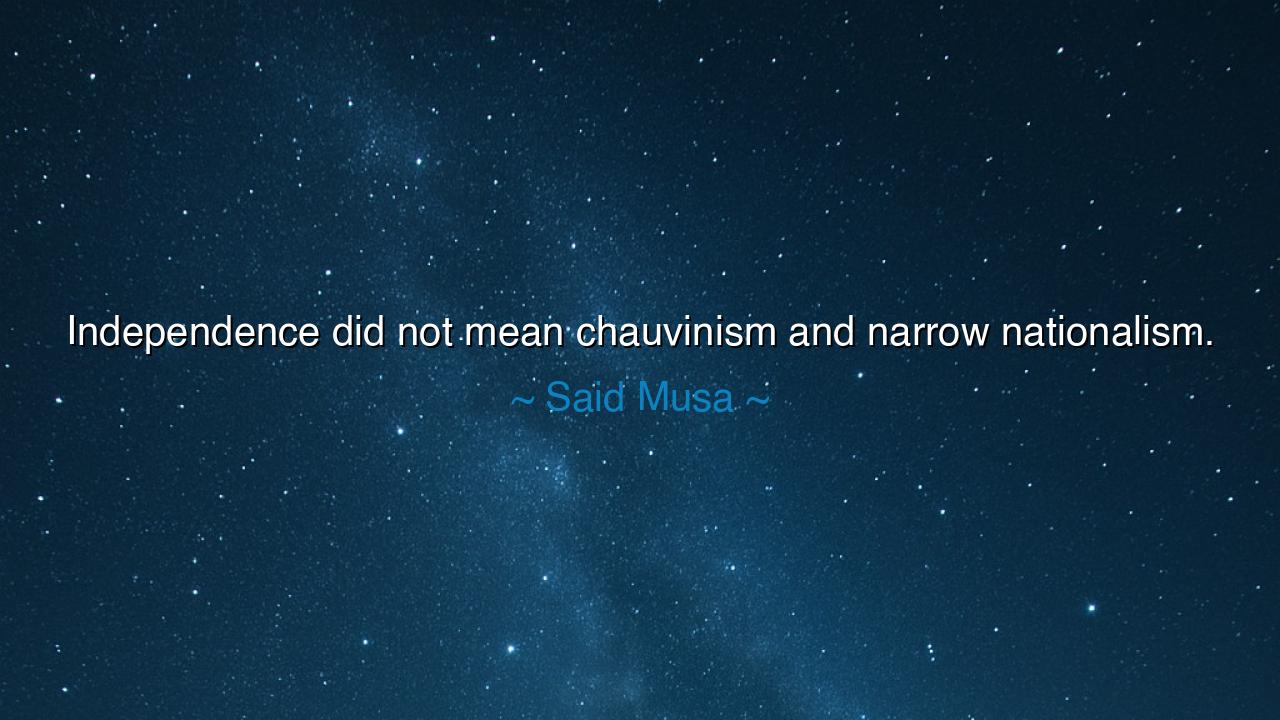
Independence did not mean chauvinism and narrow nationalism.






Hear, O children of the future, the words of Said Musa, a voice that spoke with the clarity of those who had lived through the fires of struggle and emerged with wisdom. "Independence did not mean chauvinism and narrow nationalism." These words are a call, a profound reminder that the true meaning of freedom lies not in the isolation of the self, nor in the exclusion of others, but in the celebration of humanity’s shared dignity. To understand this truth, we must delve deep into the meaning of independence, not as a fortress that shuts out the world, but as a garden that flourishes when nurtured by the unity of diverse peoples.
Independence, O children, is often misunderstood. Too many have come to believe that it is a call for the exaltation of the self, a cry for sovereignty that is defined by exclusion, by the building of walls rather than bridges. This was the trap into which many fell throughout history— chauvinism, that dangerous and narrow ideology that elevates one group over another, seeing strength in division and power in hatred. And nationalism, when twisted, becomes not the celebration of culture, but the imposition of culture on others, a belief that one's identity must be preserved at the expense of others. But true independence—as Musa teaches us—is not about domination. It is not about closing the gates of the soul, but opening them to the world.
Let us turn our gaze to the ancient Greeks, whose vision of independence was rooted in the idea of a collective city-state, each one unique, yet bound by the shared values of freedom, reason, and the pursuit of truth. While the Greeks were fiercely proud of their city-states—be it Athens, Sparta, or Corinth—they did not close their eyes to the cultures and peoples beyond their borders. Rather, they sought to learn from others, to engage in dialogue, to enrich their understanding of the world. Even in their wars, there was a recognition of the shared human experience, and a hope that, through cooperation, they might build a greater, more enlightened world. Theirs was a vision of independence that did not demand the subjugation of others but sought to elevate all who sought knowledge and peace.
Consider, too, the story of India's independence from British colonial rule. In the struggle led by Mahatma Gandhi, the vision of freedom was not one of chauvinism, nor was it a narrow, exclusionary form of nationalism. Gandhi’s non-violent resistance was a call to the human spirit, one that transcended borders and cultures. He did not seek to divide, but to unite—uniting not just Indians, but calling upon the world to embrace the ideals of peace, justice, and self-determination. Gandhi understood that true independence meant not the rejection of others, but the fostering of mutual respect and cooperation. His vision was not about the destruction of an empire, but the creation of a new world order based on the principles of equality and shared humanity.
The lesson we learn from Musa’s words and these great examples is clear: independence is not the act of selfish isolation, nor is it a weapon to be wielded against others. It is the freedom to shape one’s destiny while embracing the destinies of others. It is the right to live in sovereignty, but with the recognition that our true strength lies in our unity—not only with our own people, but with all peoples. It is the courage to stand tall as a nation, but with the wisdom to recognize the shared ties that bind us all. Independence, when defined by chauvinism or narrow nationalism, becomes a force of destruction. But when it is rooted in compassion, in the belief that all humans are worthy of dignity and respect, it becomes a force of empowerment and unity.
So, O children of the future, let these words guide your hearts: to be truly free is not to elevate one above another, but to lift all together. To be independent is not to isolate, but to connect with others, to understand that the strength of one is the strength of all. The true vision of independence is not the rejection of others, but the embracing of their humanity. Stand firm in your identity, but remember always that the greatness of any nation is measured not by how it stands alone, but by how it stands with others. Let this wisdom shape the world you will inherit: independence is a path to unity, not division, and the strength of a nation lies in its capacity to build bridges, not walls.






AAdministratorAdministrator
Welcome, honored guests. Please leave a comment, we will respond soon